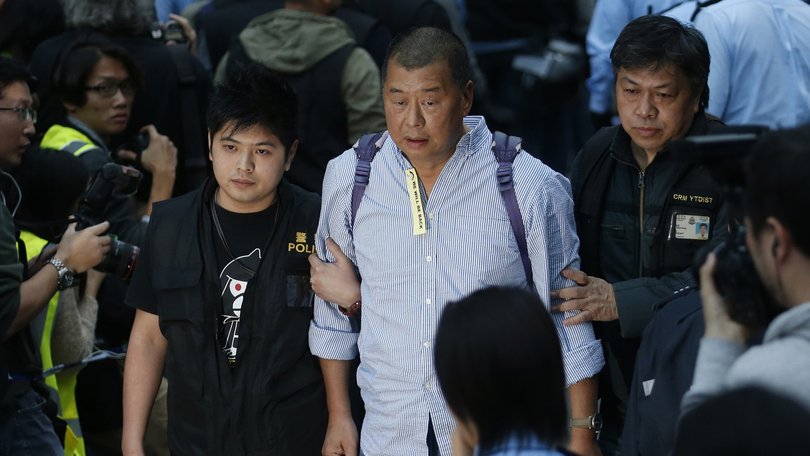Hong Kong court begins hearing final arguments in Jimmy Lai's national security trial
Pro-democracy newspaper founder Jimmy Lai could be sentenced to up to life in prison if he is convicted under Beijing’s national security laws.

A Hong Kong court began hearing final arguments Monday in the landmark national security trial of former pro-democracy newspaper founder Jimmy Lai, who could be sentenced to up to life in prison if he is convicted.
Mr Lai, 77, was arrested in 2020 under a national security law imposed by Beijing following anti-government protests in 2019. He is being tried on charges of colluding with foreign forces to endanger national security and conspiring with others to issue seditious publications.
Mr Lai founded Apple Daily, one of the local media outlets that was most critical against Hong Kong’s government. His high-profile case — which has already stretched nearly 150 days, far beyond the original estimate of 80 days — is widely seen as a trial of press freedom and a test for judicial independence in the Asian financial hub.
Sign up to The Nightly's newsletters.
Get the first look at the digital newspaper, curated daily stories and breaking headlines delivered to your inbox.
By continuing you agree to our Terms and Privacy Policy.Prosecutors allege that Mr Lai asked foreign countries, especially the United States, to take actions against Beijing “under the guise of fighting for freedom and democracy.”
On the first day of his testimony, he denied he had asked then-Vice President Mike Pence and then-Secretary of State Mike Pompeo to take action against Hong Kong and China during the 2019 protests.
Later, when Mr Lai’s lawyer questioned him about an Apple Daily report saying he had asked the US government to sanction Beijing and Hong Kong leaders, he said he must have discussed it with Pompeo, as he had no reason to doubt the accuracy of the report by the now-defunct newspaper he founded.
But Mr Lai said he would not have encouraged foreign sanctions after the national security law was enacted on June 30, 2020.
The closing arguments have been delayed twice, first due to weather then to concerns over Mr Lai’s health. On Friday, his lawyer, Robert Pang, said Mr Lai had experienced heart palpitations while in prison. The judges wanted him to secure a heart monitor and medication first.
After Friday’s hearing, the Hong Kong government alleged foreign media outlets had attempted to mislead the public about Mr Lai’s medical care. It said a medical examination of Mr Lai found no abnormalities and that the medical care he received in custody was adequate.
It is unclear when the verdict will be delivered.
When Mr Lai entered the courtroom, he waved and smiled to those sitting in the public gallery. He also briefly instructed his legal team in a voice audible to public attendees. But he closed his eyes when the prosecution laid out its legal arguments.
Prosecutor Anthony Chau said the heart monitor had been delivered to Mr Lai and that he had no complaints about his health condition.
Mr Lai’s yearslong detention, especially in solidarity confinement, has drawn concerns from foreign governments and rights groups. US President Donald Trump, before being elected to his second term in November, said he would talk to Chinese leader Xi Jinping to seek Mr Lai’s release: “One hundred percent, I will get him out.”
In a Fox News radio interview released last Thursday, Mr Trump denied saying he would “100 per cent” save Lai, but rather that he would bring the issue up. “I’ve already brought it up, and I’m going to do everything I can to save him,” he said.
China has accused Mr Lai of stirring a rise in anti-China sentiments in Hong Kong and said it firmly opposes the interference of other countries in its internal affairs.
Dozens of people waited in the rain Monday for a seat in the main courtroom to see Mr Lai. Former Apple Daily reader Susan Li said she worried about Mr Lai’s health as he looked visibly thinner, and she would continue to pray for him.
“I wanted to let him know we are still here,” she said.
When Hong Kong, a former British colony, returned to China in 1997, Beijing promised to retain the city’s civil liberties for 50 years.
But critics say that promise has become threadbare after the introduction of the security law, which Chinese and Hong Kong authorities insist was necessary for the city’s stability.
